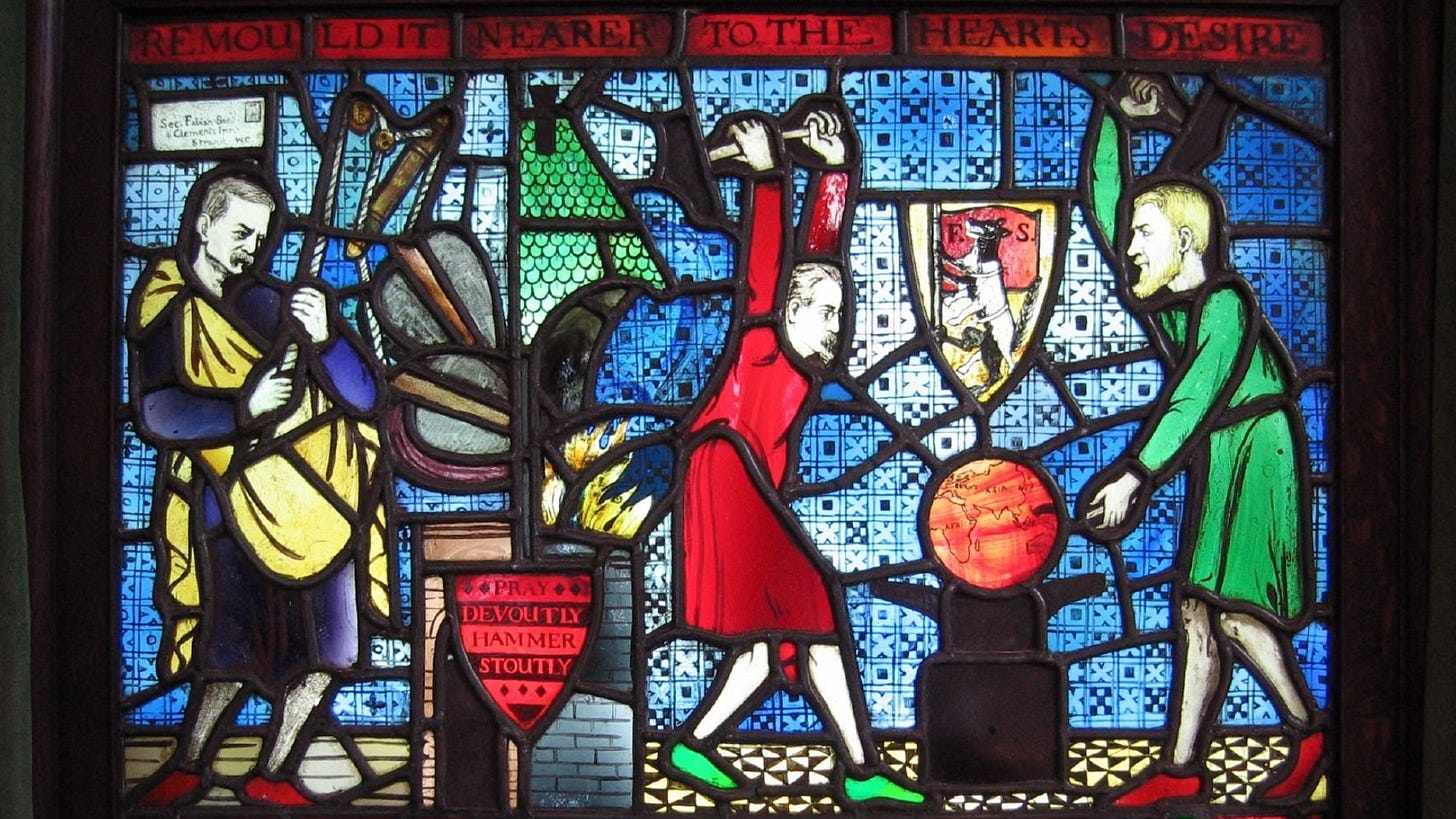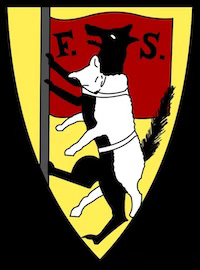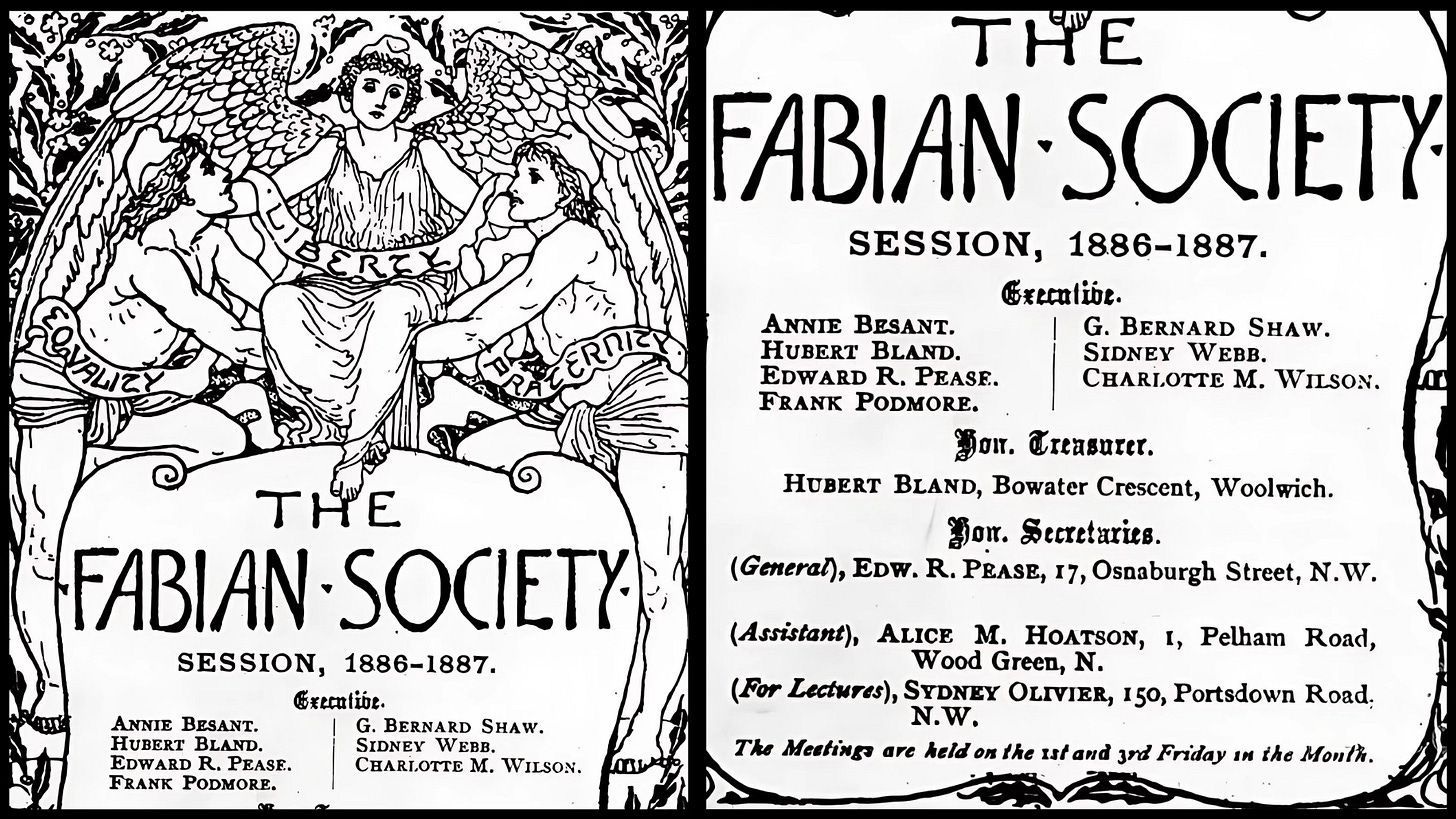The Fabian Society, founded in 1884 in Britain, (a splinter group from the Fellowship for New Life 1883 we’ve done threads on that New Agey group before) was a socialist organization that aimed to promote gradual and democratic change toward socialism rather than through revolutionary means. The Fabians were known for their intellectual approach to politics and their use of propaganda as a tool to shape public opinion, influence policy, and support social reforms. Their approach to propaganda was deliberate, strategic, and designed to slowly win over public opinion by influencing the political and intellectual elites. Their mascot is the tortoise and their coat of arms is the wolf in sheep’s clothing.
They used an Intellectual and Gradualist Approach:
- The Fabians, including prominent figures like George Bernard Shaw, Sidney Webb, and Beatrice Webb, emphasized the importance of gradual reform through education, debate, and the dissemination of ideas. They believed that propaganda should not be inflammatory or violent, but instead, it should appeal to reason and the intellect. The aim was to persuade the middle class and the political elite to adopt socialist ideas. Their motto was educate, agitate, organize. - Their approach was often compared to permeation", meaning they sought to gradually permeate existing institutions—such as political parties, especially the Labour Party—and the broader intellectual and political establishment with socialist ideas.
- The Fabians were prolific in their use of pamphlets, books, and other written materials to spread their ideas. Their most famous publication was the “Fabian Essays in Socialism" (1889), a collection of essays by prominent members that laid out their vision for gradual social reform. These essays were written in a persuasive, reasoned style, designed to appeal to the educated classes and to make the case for socialism as a practical and ethical political philosophy.
- Another influential work was Sidney and Beatrice Webb's "History of Trade Unionism" (1894), which provided an intellectual defense of the labor movement and called for policies that would protect workers’ rights through gradual state intervention.
- The Fabians were conscious of the power of symbolism in their propaganda. The famous Fabian Society logo, depicting a wolf in sheep’s clothing, was intended to represent their method of slowly infiltrating and influencing society while remaining outwardly unthreatening. (I haven’t seen it stated but I think it’s an esoteric nod to their Hegelian dialectic tactics). This reflected their belief that the best way to achieve change was not through confrontation but through stealthy and persistent advocacy.
- The Fabians were also very active in public speaking and lecturing. They believed that education was crucial for spreading their ideas, and members like George Bernard Shaw became famous for their public speaking engagements, where they would use logical argumentation to advocate for socialism.
- Their lecture tours and participation in debates were key components of their propaganda strategy, engaging directly with the public and intellectuals to sway opinions on social issues.
- One of the Fabians' most important contributions to propaganda was their focus on influencing political institutions, especially through the Labour Party which they were integral to founding in 1900. Many Fabian Society members played key roles in the formation of the Labour Party in 1900, and their ideas shaped much of the party's early platform, including support for nationalized industry, social welfare, and workers' rights.
- Their strategy of “permeation" involved working within the existing system, influencing policymakers from within, and providing intellectual backing for progressive reforms. This indirect method of propagating socialist ideas was central to their long-term strategy of achieving socialism through legislation and reform, rather than direct revolutionary action. Dr John Coleman referred to Tavistock’s technique (largely created by Fabian’s) as “long range penetration and inner directional conditioning”.
- In the later years of the 20th century, the Fabians adapted their propaganda to the changing media landscape, including the use of film and radio to spread their ideas. For example, during the mid-20th century, leftist intellectuals and labour advocates who were influenced by Fabian ideals used radio and television to promote ideas of social reform, equality, and welfare.
Key Themes in Fabian Propaganda:
- Social Justice and Equality: The Fabians consistently emphasized the need for a more just and equal society, advocating for policies like universal healthcare, free education, progressive taxation, and nationalization of key industries.
- Rational, Scientific Socialism: They presented socialism as a logical, rational system of governance that could be achieved through careful planning and government intervention, not through emotional appeals or class warfare.
- Gradualism over Revolution: Unlike many other socialist or communist movements, the Fabians believed that gradual reform through democratic institutions was the best way to achieve social change. Their propaganda focused on educating the public and policymakers, rather than inciting revolutionary action.
- Moral and Ethical Justifications: The Fabians often used moral arguments to appeal to the sense of fairness and justice within the middle and upper classes. They argued that socialism was not only efficient but also ethically necessary to combat poverty, inequality, and social injustice.
- The Fabians’ influence extended well beyond Britain, shaping social democratic and labour movements around the world. Their methodical, intellectual approach to propaganda had a lasting impact on how political ideas were communicated and how socialist and social democratic movements framed their messaging.
- Their legacy can be seen in the development of the British Labour Party, which adopted many of the Fabians’ ideas, including the creation of the welfare state after World War II, with policies like the National Health Service (NHS) being directly influenced by Fabian ideals.
TL;DR -
Fabian use of propaganda was characterized by its intellectual, gradualist approach hence why their mascot is the tortoise. Through publications, lectures, and involvement in political institutions, they sought to win hearts and minds with rational, moral arguments for social reform, rather than emotional or revolutionary rhetoric. Their sophisticated use of propaganda laid the groundwork for the modern social democratic movement.









